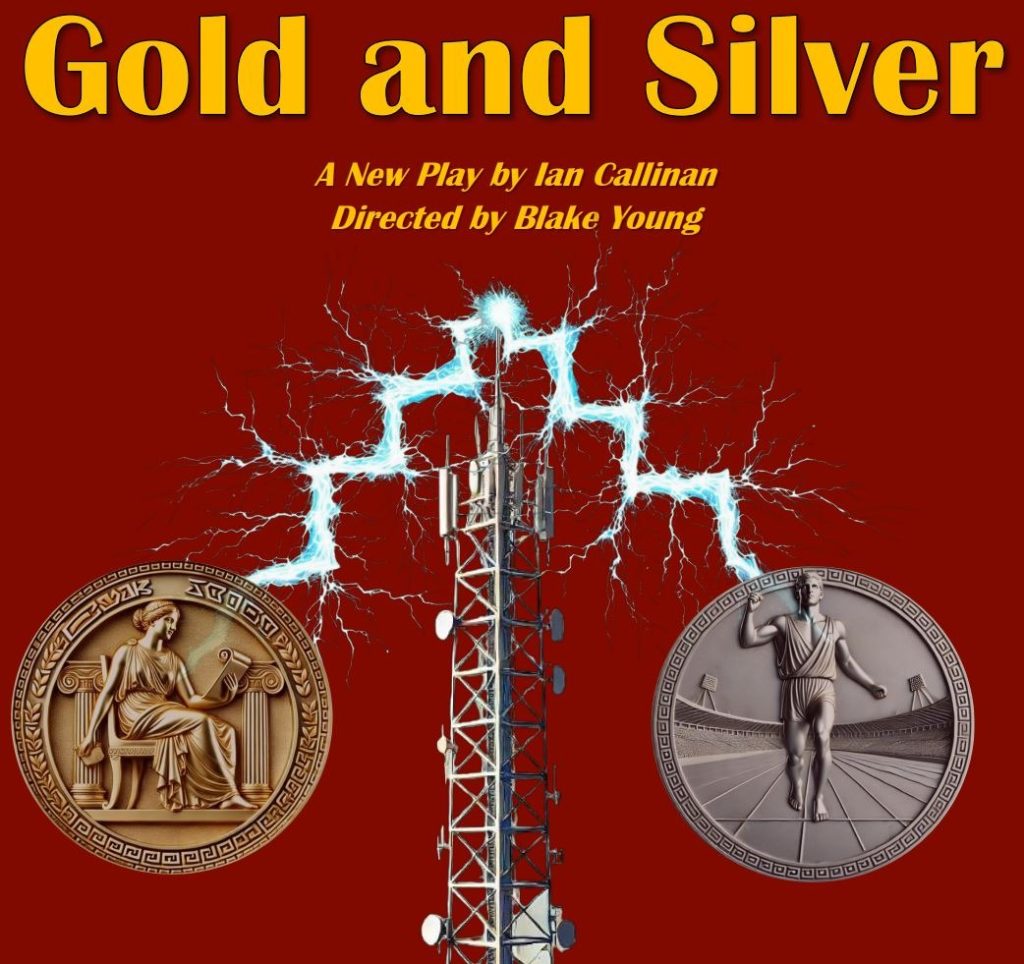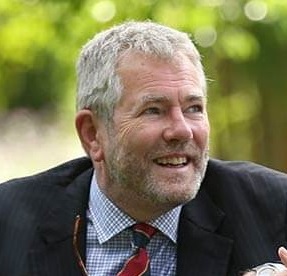FEATURE ARTICLE -
Issue 98: December 2024, Reviews and the Arts
A review of “Gold and Silver” by Ian CallinanThe Theatre @ 210 Petrie Terrace, 14 to 23 November 2024

Theatre-goers who recall Ian Callinan’s previous stage productions (Brazilian Blue, The Cellophane Ceiling, The Acquisition and A Hero’s Funeral) may be surprised by his latest drama, Gold and Silver. Ostensibly a work which contrasts the values which society attributes to sporting and scientific achievements, and the ethical dilemmas posed by each discipline, it is – more than anything else – a stage-play about stage-plays.
There is none of the plot-driven, narrative impetus of Callinan’s previous works. In fact, there is barely a story at all: merely a situation, or rather series of situations, in which the main characters are confronted with specific quandaries, and respond with very different – yet compellingly plausible, and ultimately euphonious – human reactions. These reactions are presaged with references, sometimes overt and sometimes almost subliminal, mirroring the plot-lines and tropes of well-known literary works: poetical, lyrical, cinematic, but mostly theatrical.
The play’s structure is not unlike that of the famous second movement (Allegretto) from Beethoven’s Seventh Symphony. There is practically no tune or melody – merely a beat or rhythmic ostinato, in 2/4 time, something like the ground bass for a Baroque passacaglia, which best resembles a message in morse code: “long-short-short-long-long” – which Beethoven explores through different key modulations and different chord progressions, with different dynamics and different instrumentation, as if searching in the musical wilderness for an elusive harmonic resolution. Only in the final moments is this resolution achieved, with a rapid descent into the tonic key celebrated by a triumphant fugato. Yet there are hints along the way, referencing earlier works by Mozart and Josef Haydn, from which the astute listener may begin to discern a faint light at the end of a long and serpentine tunnel.
Callinan generously credits his audience with at least a passing familiarity with the sources of the literary references, from Lewis Carroll to Terence Rattigan, from Noël Coward to Eugène Ionesco, from Lerner and Loewe to Alan Bennett and Samuel Beckett, and occasionally from Hollywood’s ‘golden years’. But he also spices these references with little-known anecdotes about the respective playwrights’ connections with the sport of cricket, while avoiding (perhaps deliberately) Oscar Wilde’s bon mot that he never played cricket because “it requires one to assume such indecent postures.”
With a bravura reminiscent of Tom Stoppard, whose Rosencrantz and Guildenstern Are Dead might well have served as an inspiration for this stage-play about stage-plays, Callinan utterly eschews the Gilbertian dramatic formula: that is, the formula by which the main characters assemble in serried ranks to introduce themselves or to be introduced (“I am the very model of a modern major-general”, “Behold the Lord High Executioner”, “I am the captain of the Pinafore”, “Three little maids from school are we”, “Over the bright blue sea / Comes Sir Joseph Porter KCB”, “For I am a pirate king”, etc. etc.) and proceed to foreshadow their parts in the unfolding narrative. Instead, the first scene presents (but never quite gets around to introducing) the principal protagonists, Mark and Sarah, in what appears to be a waiting room, which we slowly gather is the waiting room for some kind of medical specialist, and later discover to be the waiting room of an oncologist.
Chronologically, this first scene is actually the penultimate stage in the drama, so we are then carried back in time to discover who they are, and how an Olympic athlete and silver medallist (Mark) has come to be married to a scientist with three academic gold medals (Sarah). Mark, it transpires, is a sprinter, whose entire subsequent life – which, as we glean, could well prove to be tragically shorter than expected of an elite athlete – is an anticlimax to being the second-fastest man in the world. Sarah is working on a tech start-up, creating an artificial intelligence algorithm which, when perfected, will effectively read minds.
Mark’s challenges are those of the successful sportsman whose star is waning, particularly after a knee injury prevents him from performing competitively: Should he demean himself by pursuing a sporting scholarship for a dumbed-down degree from a second-tier US university, or accepting a coaching position, or succumbing to the ultimate dumping-ground of sporting has-beens as a media commentator?; Or should he demean himself even further, by becoming house-husband and toy-boy to his gifted and financially successful wife? Sarah’s conundrums are more profound: Is it conscionable to accept a huge pay-out for intellectual property which, in the wrong hands, may prove to be the end of human life as we know it?; What responsibilities does she owe to her junior partner, a socially awkward but brilliant computer programmer?
If there is any flaw in Callinan’s script, it is that the dialogue is too subtle, too nuanced, too sophisticated to be adequately conveyed by an amateur cast. This is not meant as criticism of the valiant actors who courageously accepted these demanding rôles: if the play had been filmed in 1964, with the same cast as the movie of Goldfinger made in that year, it is doubtful that even Sean Connery and Honor Blackman – let alone Gert Fröbe, taking the part of Sarah’s uncle Jack – would have found the task an easy one.
But this is not a comedy of wit and manners; neither is it a drawing-room drama or an action-adventure. It is an ambitious, thought-provoking, and unashamedly intellectual work, directed at an open-minded, literate and perceptive audience: think of Waiting for Godot, laced with cryptic literary clues to steer the audience’s minds in the right direction. The preview performance attracted such an audience, who showed their deep appreciation and gratitude. Such existentialist drama (which is perhaps the most appropriate taxonomical classification of Gold and Silver) requires talents which are not readily available in Hollywood, any more than they are available in Brisbane’s vibrant amateur theatrical community.
When I informed my wife and daughter that I had purchased tickets to Ian Callinan’s new play, the latter – like any healthily sceptical seventeen-year-old – asked why I had chosen this particular work. I replied that I had seen each of his previous plays, and they were great fun; also, that she might like to meet the playwright. She looked astonished: “Are you sure he is going to be there”? I assured her that he always attends the opening night, and also mentioned that he was a great friend of her late grandfather’s. “You mean, Opi Hampson knew Sir Ian McKellen”? I am not quite sure how my daughter confused the names Ian Callinan and Ian McKellen, but the mix-up might have been prophetic.
To do this play justice, one hopes that its next opening will be in the West End, with the likes of (say) Daniel Radcliffe or Jacob Elordi, and (say) Anya Taylor-Joy or Emily Blunt, in the leading parts. If anyone could carry that off, Ian Callinan most certainly will.



